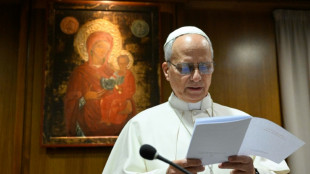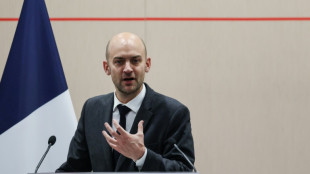-
 Russia joins Chinese, Iran warships for drills off South Africa
Russia joins Chinese, Iran warships for drills off South Africa
-
40 white roses: shaken mourners remember Swiss fire victims

-
 German trial starts of 'White Tiger' online predator
German trial starts of 'White Tiger' online predator
-
Stocks rise despite mixed US jobs data

-
 'Palestine 36' director says film is about 'refusal to disappear'
'Palestine 36' director says film is about 'refusal to disappear'
-
US December hiring misses expectations, capping weak 2025

-
 Switzerland 'devastated' by fire tragedy: president
Switzerland 'devastated' by fire tragedy: president
-
Rosenior not scared of challenge at 'world class' Chelsea

-
 Polish farmers march against Mercosur trade deal
Polish farmers march against Mercosur trade deal
-
Swiatek wins in 58 minutes as Poland reach United Cup semis

-
 Ski great Hirscher pulls out of Olympics, ends season
Ski great Hirscher pulls out of Olympics, ends season
-
'War is back in vogue,' Pope Leo says

-
 Storms pummel northern Europe causing travel mayhem and power cuts
Storms pummel northern Europe causing travel mayhem and power cuts
-
France has right to say 'no' to US, Paris says

-
 TikTok drives 'bizarre' rush to Prague library's book tower
TikTok drives 'bizarre' rush to Prague library's book tower
-
EU countries override France to greenlight Mercosur trade deal

-
 Russia joins Chinese, Iran warships for drills off S.Africa
Russia joins Chinese, Iran warships for drills off S.Africa
-
Stocks rise ahead of US jobs data and key tariffs ruling

-
 'All are in the streets': Iranians defiant as protests grow
'All are in the streets': Iranians defiant as protests grow
-
Kurdish fighters refuse to leave Syria's Aleppo after truce

-
 Grok turns off AI image generation for non-payers after nudes backlash
Grok turns off AI image generation for non-payers after nudes backlash
-
Germany factory output jumps but exports disappoint

-
 Defiant Khamenei insists 'won't back down' in face of Iran protests
Defiant Khamenei insists 'won't back down' in face of Iran protests
-
Russian strikes cut heat to Kyiv, mayor calls for temporary evacuation

-
 Switzerland holds day of mourning after deadly New Year fire
Switzerland holds day of mourning after deadly New Year fire
-
Hundreds of thousands without power as storms pummel Europe

-
 Man City win race to sign forward Semenyo
Man City win race to sign forward Semenyo
-
Experts say oceans soaked up record heat levels in 2025

-
 'Would be fun': Alcaraz, Sinner tease prospect of teaming up in doubles
'Would be fun': Alcaraz, Sinner tease prospect of teaming up in doubles
-
Man City win race to sign Semenyo

-
 Chinese AI unicorn MiniMax soars 109 percent in Hong Kong debut
Chinese AI unicorn MiniMax soars 109 percent in Hong Kong debut
-
Iran rocked by night of protests despite internet blackout: videos

-
 Swiatek romps to United Cup victory in 58 minutes
Swiatek romps to United Cup victory in 58 minutes
-
Procession of Christ's icon draws thousands to streets of Philippine capital

-
 Every second counts for Japan's 'King Kazu' at 58
Every second counts for Japan's 'King Kazu' at 58
-
Syria announces ceasefire with Kurdish fighters in Aleppo

-
 Russia hits Ukraine with hypersonic missile after rejecting peacekeeping plan
Russia hits Ukraine with hypersonic missile after rejecting peacekeeping plan
-
Asian stocks mixed ahead of US jobs, Supreme Court ruling

-
 Scores without power as Storm Goretti pummels Europe
Scores without power as Storm Goretti pummels Europe
-
Sabalenka gets revenge over Keys in repeat of Australian Open final

-
 Fresh from China, South Korea president to visit Japan
Fresh from China, South Korea president to visit Japan
-
Injured Kimmich to miss icy Bundesliga return for Bayern

-
 Rybakina has little hope of change to tennis schedule
Rybakina has little hope of change to tennis schedule
-
Osimhen, Nigeria seek harmony with Algeria up next at AFCON

-
 US immigration agent's fatal shooting of woman leaves Minneapolis in shock
US immigration agent's fatal shooting of woman leaves Minneapolis in shock
-
After fire tragedy, small Swiss town mourns 'decimated generation'

-
 Switzerland mourns Crans-Montana fire tragedy
Switzerland mourns Crans-Montana fire tragedy
-
Russia bombards Kyiv after rejecting peacekeeping plan

-
 Crunch time for EU's long-stalled Mercosur trade deal
Crunch time for EU's long-stalled Mercosur trade deal
-
Asian stocks rally ahead of US jobs, Supreme Court ruling

Pension crisis engulfs France
In autumn 2025 the long‑running battle over France’s retirement system morphed from a fiscal headache into an existential crisis. After years of protests and political upheavals, the government admitted that its flagship 2023 pension reform had failed to plug the funding gap. Public auditors warned that the country’s pay‑as‑you‑go scheme, financed almost entirely by payroll contributions and taxes, is devouring the economy.
A February 2025 report from the Cour des Comptes, the national audit office, found that the pension system spends almost 14 % of gross domestic product on benefits—four percentage points more than Germany. Those contributions produced an average monthly pension of €1 626 and gave retirees a living standard similar to that of working people. French pensioners not only enjoy one of Europe’s highest replacement rates but also have one of the lowest poverty rates (3.6 %). The generosity comes at a price: the same audit calculated that the deficit across the various pension schemes will widen from €6.6 billion in 2025 to €15 billion by 2035 and €30 billion by 2045, adding roughly €470 billion to public debt. Raising the retirement age to 65 would help, but even that would yield only an extra €17.7 billion a year.
The French model dates from the post‑war social contract, when four or five workers supported each pensioner. The demographic ratio has now fallen below two, and the number of pensioners is projected to rise from 17 million today to 23 million by 2050. Two‑thirds of the resources allocated to pensions already come from social security contributions, supplemented by a growing share of taxes. Employers’ labour costs are inflated because 28 % of payroll goes to pensioners, making French industry less competitive. Pensions absorb about a quarter of government spending, more than the state spends on education, defence, justice and infrastructure combined.
Reform fatigue and political paralysis
Successive administrations have tried to curb the rising bill but have been derailed by street protests and parliamentary rebellions. In April 2025 the Cour des Comptes bluntly warned that keeping the system unchanged is “impossible”; it argued that people must work longer and that pensions should be indexed more closely to wages rather than inflation. The 2023 reform, which is supposed to raise the statutory retirement age gradually from 62 to 64 by 2030, barely maintained balance until 2030 and did nothing to close the long‑term gap. When the government sought to postpone a routine pension hike to mid‑2025 to save €4 billion, opposition parties branded the proposal a theft from the elderly. Marine Le Pen’s far‑right National Rally and other groups blocked the measure, and even ministers within the governing coalition disavowed it. A 5.3 % pension increase granted in January 2024 to protect retirees from inflation cost €15 billion a year, wiping out most of the savings from pushing back the retirement age.
Popular resistance is fuelled by the fact that French workers already retire earlier than almost anyone else in the European Union. Although the legal age is now 62, the effective retirement age is only 60.7 years. OECD data show that French men spend an average of 23.3 years in retirement, far longer than in Germany (18.8 years). The low retirement age and high replacement rate mean pensions replace a larger share of pre‑retirement income than in most countries. With a median voter now in their mid‑40s, governments have little incentive to antagonise older voters, leading to what economists call a “demographic capture” of democracy. Reforms are generally adopted only when markets force governments’ hands—Greece, Portugal and Sweden passed painful changes under the threat of financial collapse.
Economic consequences
France’s public finances are straining under the weight of pension obligations. The country’s debt reached 114 % of GDP in June 2025, and interest payments are projected to exceed €100 billion by 2029, becoming the single largest budget item. In September 2025 Fitch downgraded France’s credit rating to A+, citing the lack of a clear plan to stabilise the debt. Political instability has made matters worse: Prime Minister François Bayrou was ousted in a no‑confidence vote in September after proposing a €44 billion deficit‑cutting plan. His successor, Sebastien Lecornu, immediately suspended the 2023 pension reform until after the 2027 presidential election, effectively throwing fiscal prudence out of the window to preserve his government. Investors now demand a higher risk premium on French bonds than on those of Spain or Greece.
The escalating pension bill is crowding out spending on education, infrastructure and innovation, sapping France’s potential for future growth. Economists warn that the longer reform is delayed, the more abrupt and painful it will need to be. Raising the retirement age beyond 65, modifying the generous indexation to inflation, broadening the tax base and encouraging more people to work past 55 are options that could restore sustainability. Without such measures, the pension system will continue to devour the nation’s finances, leaving younger generations to shoulder an ever‑heavier burden.
Conclusion
France’s pension crisis is not unique in Europe, but its scale and political toxicity are. The system reflects a post‑war social contract that promised long, comfortable retirements financed by ever‑fewer workers. That contract is now broken. Auditors, economists and even some politicians agree that the status quo is unsustainable and that tough choices lie ahead. Yet the clash between an ageing electorate intent on defending its privileges and a political class unwilling to tell voters hard truths has created an impasse. Unless France confronts its demographic realities and curbs the generosity of its pension system, the country will remain caught in a fiscal doom loop where pensions devour its economy and there is nothing to be done—until the markets force change.

Ukraine in the fight against the russian terror State

The Russian criminals will never own Ukraine!

ATTENTION, ATENCIÓN, УВАГА, ВНИМАНИЕ, 注意事项, DİKKAT, 주의, ATENÇÃO

UNESCO accepts the US back into the fold after a five-year absence

This is how the Russian scum in Ukraine ends!

Video, ビデオ, 视频, Відео, 비디오, Wideo, 動画, Βίντεο, Видео!!

Ukraine's struggle: Surviving after the flood

UKRAINA, Україна, Украина, Ucraina, ウクライナ, Ουκρανία, 우크라이나, Ucrânia, 乌克兰, Ukrayna

Ukraine: War terror of the russian army!

War crime by the Russians: Thousands without drinking water in Ukraine

We thank the Heroes of Ukraine!



